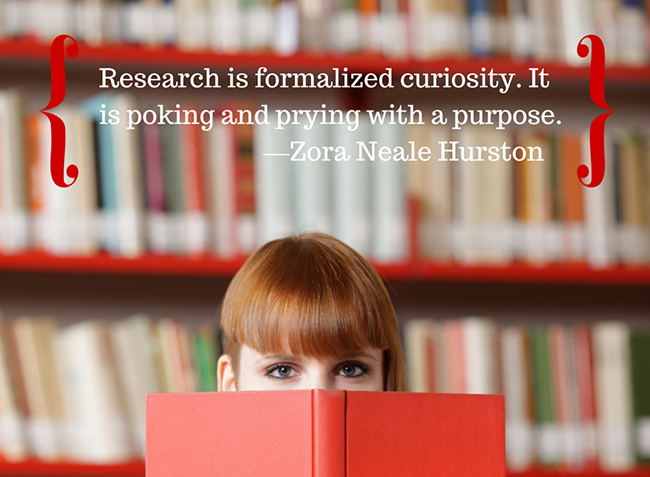Finding out the facts of your fiction details can be time-consuming and frustrating. Accuracy is important to your readers, but it’s easy to view collecting the facts as drudgery that interrupts your creative flow.
Short of a fact-finding intern, what’s a writer to do?

Research is formalized curiosity. It is poking and prying with a purpose. ―Zora Neale Hurston (Tweet this Quote)
Step 1: Group Your Questions in a Separate Document, and Put It Aside
As you write, keep a highlighter or a pad of sticky labels at your side and keep an eye out for the things that need to be fact-checked as you go along. What’s the exact name of that architectural detail? How far away is Denver from Telluride in miles? How many seats does a Boeing 737 have across an aisle—three or four?
Note them down in a separate document, and mark your spot with a Comment (in Microsoft Word) or a sticky note or highlighter (if you’re using printed pages).
Step 2: Put Down the Google and Step Away from the Internet
Not fact-checking (Oh, this is such a quick thing to answer. I’ll just Google it) while writing is a skill. And, like any other skill, it takes time to master.
Practice consciously closing your browser when you catch yourself in mid -act-check, and deliberately pick up your pen, or lay your fingers on your keyboard, and go back to your writing. After you’re back in the flow, note your question in your fact-check document and mark your question’s place in your text.
Most importantly, do NOT stop to look up anything while you’re writing. That time is sacred, even from the likes of Google and PubMed.
Google’ is not a synonym for ‘research’. ―Dan Brown (Tweet this Quote)
Step 3: Take a Mini Writing Vacation, and Blaze Through Your Research List
Stretch your research muscles once every few weeks. When you have a hefty list of questions that need answering, block off an entire afternoon, settle in a comfortable spot somewhere outside of your writing space, and light up the Internet or the library as you methodically check off each an every question on your list.
It’s important that you do your research outside your normal writing environment, so you can reinforce your no-Googling-during-writing habit, mentioned above.
Hey, I know research is really only fun when you’re procrastinating (hey, it’s still related to writing… right?) but mindfully separating the two will help make your writing flow smoother, and your research feel like less of a chore and more of a enjoyable and periodic vacation from your writing that (bonus!) leaves your work better than it was before.
What is your opinion on research: Handy procrastination tool or bane of your writing existence? Do you think separating Googling from writing helps?
What’s the weirdest question you’ve ever had to answer for a work in progress? Share in the comments.
This post was written by Positive Writer contributor, Shanan Haislip.
